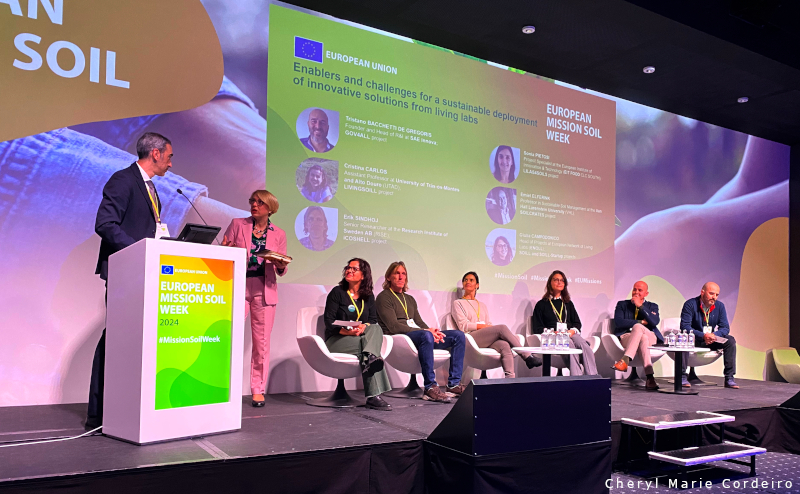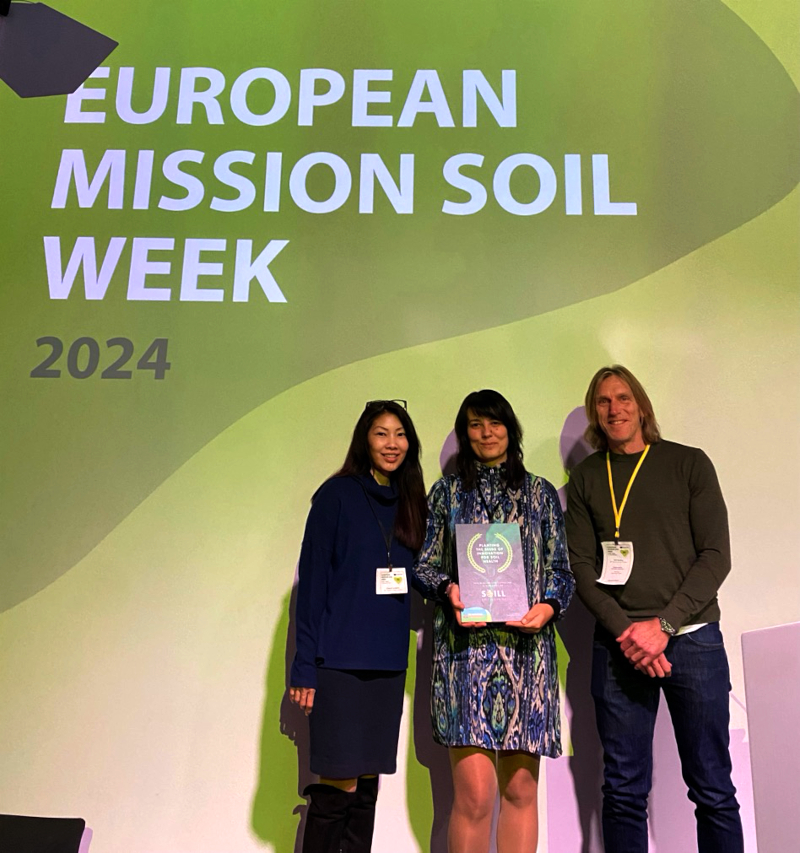
At the EU Mission Soil Week 2024, Brussels, Belgium.
Text & Photo © CM Cordeiro 2024
European Mission Soil Week 2024 brought together policymakers, researchers, industry leaders, and community stakeholders to address the critical challenges of soil health, climate resilience, and sustainable land management. With 60–70% of EU soils classified as unhealthy, the event underscored the urgent need for innovative and collaborative approaches to reverse degradation trends and ensure a sustainable future.
This year’s event featured a packed program of plenary sessions, breakout discussions, and immersive field visits, showcasing how the EU Mission Soil initiative is driving progress toward its goal of 100 Living Labs and Lighthouses by 2030. Among these, the iCOSHELLs (Innovative Co-Creation Soil Health Living Labs) project was highlighted as one of 25 established Living Labs, representing a beacon of innovation in tackling diverse soil health challenges across Europe.
Highlights from Mission Soil Week
1. iCOSHELLs: Pioneering Soil Health Restoration
Funded under Horizon Europe, iCOSHELLs is a groundbreaking initiative aimed at restoring soil health across six diverse regions: Sweden, Spain, the Basque region, Italy, Greece, and Bulgaria. As one of 25 Living Labs established under the EU Mission Soil initiative, iCOSHELLs exemplifies a collaborative model that integrates science, practice, and policy to address specific soil challenges in various climatic and cultural contexts.
Key Features of iCOSHELLs:
- Living Labs as Innovation Hubs: These hubs bring together landowners, researchers, policymakers, and local communities to test and validate innovative soil health solutions.
- Stakeholder Engagement: The project aims to engage over 30,000 citizens, enhancing soil literacy and promoting sustainable practices.
- Long-Term Impacts:
- Environmental: Restoration of 5,000 hectares of soil and improved biodiversity.
- Economic: Boosting agricultural productivity and fostering new businesses on reclaimed land.
- Social: Creating a foundation for sustainable, community-driven practices.
2. Insights from Field Visits: Learning from the City of Leuven
As part of the event’s hands-on learning experiences, participants explored Leuven, Belgium, where innovative approaches to climate adaptation and soil management were showcased. As part of the Life Pact project, Leuven demonstrated how participatory spatial planning and depaving urban areas can transform neighborhoods.
Key Takeaways from Leuven’s Field Visit:
- Greenspace Expansion: A neighborhood increased greenspaces by 40%, enhancing biodiversity, reducing heat, and mitigating climate risks.
- Community-Driven Initiatives: Citizen engagement played a pivotal role in ensuring the long-term success of depaving and soil restoration efforts.
- Climate-Neutral Urban Planning: The Leuven Climate City Contract aligns soil health with broader sustainability goals, positioning the city as a hub of innovation under the EU’s ”100 Climate-Neutral and Smart Cities” mission.
3. The Soil Monitoring Law
A recurring theme during Mission Soil Week 2024 was the proposed Soil Monitoring Law, a groundbreaking directive that is moving closer to legislative finalization. This pivotal framework seeks to establish consistent, measurable standards for monitoring soil health across the European Union, addressing the alarming reality that 60–70% of EU soils are currently classified as unhealthy. By introducing standardized soil health indicators, the law aims to harmonize monitoring efforts across member states, ensuring that soil conditions are assessed and tracked using robust, science-based methodologies.
Another critical objective is the identification and remediation of contaminated sites, which pose significant risks to human health, ecosystems, and food security. The directive outlines clear processes to prioritize and rehabilitate these areas, helping to restore their capacity to provide essential ecosystem services. Additionally, the law emphasizes fostering sustainable soil management practices by providing actionable legislative support. This includes promoting nature-based solutions, reducing soil degradation, and aligning land use with climate resilience and biodiversity goals. Together, these measures form a comprehensive strategy to protect and restore soil health, reflecting the EU’s commitment to achieving sustainable land management and broader environmental objectives by 2050.
4. Co-Creation and Living Labs: The Power of Collaboration
The plenary session on Living Labs was a focal point of Mission Soil Week 2024. Representatives from five pioneering Mission Soil projects discussed the successes and challenges of Living Labs (LLs) in driving transformative solutions for soil health across Europe. LLs were identified as critical tools for achieving the EU’s soil health objectives, offering experimental hubs for co-creation, stakeholder engagement, and scalable innovation.
Speakers and Their Contributions
- Erik Sindhöj (RISE, Research Institutes of Sweden): Highlighted the importance of integrating research, innovation, and community-driven solutions in tackling soil degradation, ensuring practical and scalable outcomes.
- Tristano Bacchetti De Gregoris (SAE Innova, GOV4ALL Project): Stressed the role of SMEs in innovation, showcasing how the GOV4ALL project integrates agricultural waste recycling with policy frameworks.
- Cristina Carlos (University of Trás-os-Montes and Alto Douro, LIVINGSOIL Project): Shared strategies for engaging stakeholders, particularly in regions prone to soil erosion.
- Sonia Pietosi (EIT Food CLC South, LILA4SOILS Project): Emphasized the importance of soil literacy and community engagement to ensure long-term sustainability.
- Emiel Elferink (Van Hall Larenstein, SOILCRATES Project): Focused on resilience-building and innovative soil management practices through farmer engagement.
- Giulia Campodonico (European Network of Living Labs – ENoLL): Highlighted the importance of knowledge sharing, networking, and capacity building to scale Living Labs across Europe.
Key Discussion Points
The plenary session on Living Labs emphasized the critical importance of collaborative frameworks in addressing soil health challenges. Speakers highlighted that successful solutions require the active involvement of farmers, researchers, policymakers, and local communities. By bringing these stakeholders together, Living Labs create environments where diverse perspectives and expertise can converge to co-create actionable, region-specific solutions. This collaboration ensures that interventions are not only scientifically robust but also practically applicable and widely accepted.
Funding synergies were identified as a cornerstone for the long-term viability of Living Labs. Panelists stressed the need for aligning local, national, and EU-level funding streams to sustain Living Labs beyond initial pilot phases. Public-private partnerships were spotlighted as a powerful mechanism to unlock additional resources, enabling Living Labs to scale their operations and maximize impact.
Scalability and replication emerged as another critical discussion point. The session demonstrated how Living Labs’ regional approaches can serve as models for broader strategies across Europe. By capturing and sharing insights from local experiments, Living Labs can inform EU-wide policies and practices, accelerating progress toward the Mission Soil objectives of restoring healthy soils by 2050.
However, challenges and barriers remain. Panelists noted persistent issues such as securing stakeholder buy-in, navigating complex regulatory frameworks, and addressing potential inequities in the distribution of benefits. These hurdles highlight the need for adaptive management and flexibility, ensuring that Living Labs can overcome obstacles while maintaining stakeholder trust and engagement.
Looking ahead, the session called for a bold vision to shape the future of Living Labs. Expanding the use of digital tools, such as IoT-based soil monitoring and AI-driven decision support systems, was seen as essential to enhance efficiency and scalability. Fostering community ownership of projects was emphasized as a way to ensure that solutions are sustainable in the long term, with local stakeholders taking pride and responsibility for maintaining progress. Ultimately, the integration of advanced technologies, coupled with a deep commitment to collaboration and sustainability, will enable Living Labs to serve as transformative catalysts in Europe’s soil health journey.

The plenary session on Living Labs.

Recognition for pioneering Living Labs in EU Mission Soil Week, with Erik Sindhöj, Senior Scientist at RISE, Sweden and Rumyana Georgieva, Chief Assistant Professor at Agricultural University Plovdiv, Bulgaria.